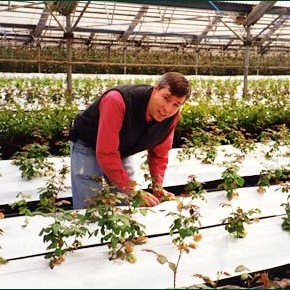Producer


Peterkort Roses LLC
Contact: Norman Peterkort & Sandra Laubenthal
City: Hillsboro, OR, 97123
Website: https://www.peterkortroses.com/
About Us
The Peterkort family has a long history in the flower business, starting out near Portland in 1923 and moving to the current location in Hillsboro during the 1980s. Everybody started out working in the greenhouse and grading room during summer holidays, often under the watchful eyes of parents and grandparents. “I weeded rose beds starting when I was six for 10 cents a bed!” remembers Sandra, the oldest.
Today growing more than 50 varieties of roses, the family has recently added freesia, ranunculus, and anemones which have proven very popular with customers. “I was talking to our aunt about growing freesias, and she said we used to grow them when she was a child!” says Sandra.
Energy efficiency and conservation is a big part of the company’s mission these days. Energy curtains and insulation are already checked off the list, with more improvements yet to come. Norman’s training in engineering comes in handy when wrestling with boiler problems and evaluating ideas for alternative energy at the farm.
The Peterkorts were founding members of the Oregon Flower Growers Association, and have long served on the board, contributing many hours towards the well-being of the Portland Flower Market. “Thank goodness for our connection with the local Portland market, especially during this time of transition in the cut flower industry,” says Sandra. The family is looking forward to a long and equally successful relationship with the Seattle Wholesale Growers Market.
Today growing more than 50 varieties of roses, the family has recently added freesia, ranunculus, and anemones which have proven very popular with customers. “I was talking to our aunt about growing freesias, and she said we used to grow them when she was a child!” says Sandra.
Energy efficiency and conservation is a big part of the company’s mission these days. Energy curtains and insulation are already checked off the list, with more improvements yet to come. Norman’s training in engineering comes in handy when wrestling with boiler problems and evaluating ideas for alternative energy at the farm.
The Peterkorts were founding members of the Oregon Flower Growers Association, and have long served on the board, contributing many hours towards the well-being of the Portland Flower Market. “Thank goodness for our connection with the local Portland market, especially during this time of transition in the cut flower industry,” says Sandra. The family is looking forward to a long and equally successful relationship with the Seattle Wholesale Growers Market.
Practices
Peterkort Roses are certified Salmon-Safe. Integrated Pest Management, with use of biological controls. They use hydroponic growing methods for their roses and lilies.
At Peterkort Roses we want to grow flowers that are as organic as humanly possible. To us that means cutting down on the use of chemical sprays. This is difficult because roses in particular are insect and disease magnets. It calls for a strategy!
Integrated Pest Management (IPM) is the name of our strategy. It involves:
- Monitoring the greenhouse carefully to catch infestations early
- Spraying only with reduced risk mixtures
- Preventing disease by controlling greenhouse conditions
- Using biological controls for insect pests
Biological controls are beneficial insects which kill aphids, spider mites, thrips, and white flies.
We first learned about this technique years ago at a rose growing conference. Then we worked with helpful folks at the Oregon State University Extension Service to learn more and get advice.
Experimentation went on for years, and we are still learning. We've had our best success with controlling aphids and spider mites. In the past we sprayed and fumigated energetically to kill these guys. Now we have insect ecosystems inside the greenhouse with a balance of predators and prey to keep the bad bugs under control.
Beneficial insects are great for pests. What about diseases such as mildew?
Diseases, like insects, are always present in the greenhouse. The key is to build up your immune system to avoid spraying. Controlling temperature, air circulation and humidity can go a long way to discourage disease.
We try to plant rose varieties which are less susceptible to getting sick. Keeping the greenhouse free of dead leaves and debris also helps.
Sometimes though the outside conditions are just too overwhelming and we must spray. In this case we use only sprays which are reduced risk, not EPA restricted ones. That means mild solutions which do not require protective clothing or restricted entry to the greenhouse.
After 60 plus years of growing roses, we are still learning and improving in this area. We're proud of our ongoing efforts. We hope you also value flowers that have less spray residue and are as organic as humanly possible!!
At Peterkort Roses we want to grow flowers that are as organic as humanly possible. To us that means cutting down on the use of chemical sprays. This is difficult because roses in particular are insect and disease magnets. It calls for a strategy!
Integrated Pest Management (IPM) is the name of our strategy. It involves:
- Monitoring the greenhouse carefully to catch infestations early
- Spraying only with reduced risk mixtures
- Preventing disease by controlling greenhouse conditions
- Using biological controls for insect pests
Biological controls are beneficial insects which kill aphids, spider mites, thrips, and white flies.
We first learned about this technique years ago at a rose growing conference. Then we worked with helpful folks at the Oregon State University Extension Service to learn more and get advice.
Experimentation went on for years, and we are still learning. We've had our best success with controlling aphids and spider mites. In the past we sprayed and fumigated energetically to kill these guys. Now we have insect ecosystems inside the greenhouse with a balance of predators and prey to keep the bad bugs under control.
Beneficial insects are great for pests. What about diseases such as mildew?
Diseases, like insects, are always present in the greenhouse. The key is to build up your immune system to avoid spraying. Controlling temperature, air circulation and humidity can go a long way to discourage disease.
We try to plant rose varieties which are less susceptible to getting sick. Keeping the greenhouse free of dead leaves and debris also helps.
Sometimes though the outside conditions are just too overwhelming and we must spray. In this case we use only sprays which are reduced risk, not EPA restricted ones. That means mild solutions which do not require protective clothing or restricted entry to the greenhouse.
After 60 plus years of growing roses, we are still learning and improving in this area. We're proud of our ongoing efforts. We hope you also value flowers that have less spray residue and are as organic as humanly possible!!
